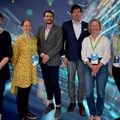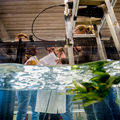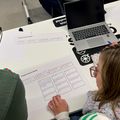Aalto Co-Educator for Teachers
We collaborate with teachers to integrate sustainability, radical creativity and entrepreneurial mindset into courses.


We collaborate with teachers to integrate sustainability, radical creativity and entrepreneurial mindset into courses.

Our aim is to facilitate curriculum development process together with programme directors.
The ACE team provides hands-on support for curriculum development. We support programs, teachers, and others by designing and facilitating development processes, analyzing curricula, organizing workshops, and providing pedagogical training.
Discover how solutions for sustainability, entrepreneurial mindset and radical creativity have been integrated into the NanoElectronics programme.

At Aalto, we meaningfully integrate solutions for sustainability into existing courses using teamwork, co-creation, and co-teaching.

Teaching period: 7.3.-23.5.2025, in English, register by 12.2.2024

The Aalto Co-Educator Team’s workshop, ‘Anxiety be Gone!: Simple practices to integrate sustainability into your course,’ allows teachers to make impactful changes to their courses without ‘rewriting the script.’

Since its establishment in 2021, the Aalto Co-educator (ACE) team has played a key role in implementing Aalto University’s “Shaping a Sustainable Future” strategy. As the first phase concludes, the ACE team is restructuring to continue its mission of supporting Aalto’s teaching community.

Aalto’s cross-disciplinary, sustainability-focused minor, ‘Sustainable Use of Natural Resources’ is a culmination of over a year of planning and creative collaboration among faculty.

Aalto equips faculty with strategies to integrate sustainability into programmes, courses and individual competence development.

Aalto University's Meeri Karvinen successfully defends her doctoral dissertation, February 2024.

As industries increasingly focus on sustainability, the demand for sustainability expertise is growing. But what specific skills do employers seek in sustainability experts?

On this page you can find tips, tools and good practices for integrating sustainability into your teaching.

Thinking about developing a minor? Check these key insights gathered from participants during the development of the new Aalto-wide sustainability minor, 'Luonnonvarojen kestävä käyttö/ Sustainable Use of Natural Resources.'

The Aalto Co-Educator team supports teachers in integrating sustainability and entrepreneurship education into their programs and courses. One approach is to ensure that online courses are available to Aalto students.

Teaching period: 7.3.-23.5.2025, in English, register by 12.2.2024

Teachers are interested in sustainability integration but are sometimes unsure how to integrate it into their courses. The method, developed by Håkan Mitts and Tuomo Eloranta, generates sustainability ideas and concepts that can be included in existing courses.

Learn more about solutions for sustainability and teamwork competencies and their integration into courses and curricula.

The Aalto Co-Educator team supports teachers to integrate solutions for sustainability into programmes and courses via a lens of radical creativity and entrepreneurial mindset.

Integrate an entrepreneurial mindset into your course and curricula with competencies drafted by the Aalto Co-Educator team.

The Aalto Co-Educator (ACE) team happily collaborates with teachers and programme directors to integrate the cross-cutting themes into courses and curricula.

Responding to the challenges of the future, such as the sustainability crisis, requires the graduate to have knowledge of sustainability challenges, multidisciplinary problem solving skills, and the ability to apply their own in-depth knowledge of the discipline to solving these challenges.

Hosted by our pedagogical expert, Riikka Evans, these podcast episodes are sure to support personal reflection on the cross-cutting themes. Listen now!
What is co-teaching? University teacher Meri Kuikka and postdoc researcher Tuomo Eloranta have been teaching together for years at Aalto and can give us invaluable and practical insights into what co-teaching means in practice.

Riikka Evans discusses integrating sustainability into teaching with Professor Matti Kuittinen from the department of Architecture at Aalto University. Matti also develops policies at the Ministry of the Environment.

What is inclusion in the context of higher education? What kind of feedback do we get from our students? And what is the teacher's responsibility? Why is it important to foster inclusive learning culture? It's all about interaction. Pirjo Kääriäinen works as a professor at Aalto University School of Arts, Design and Architecture (ARTS) and collaborates closely with the School of Chemical Engineering (CHEM). Since 2011 she has been facilitating interdisciplinary CHEMARTS collaboration together with professor Tapani Vuorinen.

Johannes Kaira works as a teacher at the Aalto Ventures Programme which is the entrepreneurship education program at Aalto University, where students in multidisciplinary teams work on hands-on exercises. We discussed with Johannes about teamwork and what it requires as a method from students and teachers. We talked about trust, communication skills and flexibility and how they contribute to a well-functioning team.





